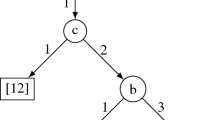Abstract
MC-nets is a concise representation of the characteristic functions that exploits a set of rules to compute payoffs. Given a MC-nets instance, the problem of computing a payoff division in the least core, which is a generalization of the core-non-emptiness problem that is known to be coNP-complete, is definitely a hard computational problem. In fact, to the best of our knowledge, no algorithm can actually compute such a payoff division for MC-nets instances with dozens of agents. We propose a new algorithm for this problem, that exploits the constraint generation technique to solve the linear programming problem that potentially has a huge number of constraints. Our experimental results are striking since, using 8 GB memory, our proposed algorithm can successfully compute a payoff division in the least core for the instances with up to 100 agents, but the naive algorithm fails due to a lack of memory for instances with 30 or more agents.
Access this chapter
Tax calculation will be finalised at checkout
Purchases are for personal use only
Preview
Unable to display preview. Download preview PDF.
Similar content being viewed by others
References
Chalkiadakis, G., Elkind, E., Wooldridge, M.: Computational Aspects of Cooperative Game Theory. Morgan & Claypool Publishers (2011)
Conitzer, V., Sandholm, T.: Complexity of constructing solutions in the core based on synergies among coalitions. Artificial Intelligence 170, 607–619 (2006)
Gillies, D.: Some Theorems on n-Person Games. Ph.D. thesis, Princeton University (1953)
Greco, G., Malizia, E., Palopoli, L., Scarcello, F.: On the complexity of core, kernel, and bargaining set. Artificial Intelligence 175(12–13), 1877–1910 (2011)
Hillier, F.S., Lieberman, G.J.: Introduction to Operations Research, 9th edn. McGraw-Hill (2010)
Ieong, S., Shoham, Y.: Marginal contribution nets: A compact representation scheme for coalitional games. In: Proceedings of the 6th ACM Conference on Electronic Commerce (EC 2005), pp. 193–202 (2005)
Liao, X., Koshimura, M., Fujita, H., Hasegawa, R.: Solving the coalition structure generation problem with MaxSAT. In: Proceedings of the 2012 IEEE 24th International Conference on Tools with Artificial Intelligence (ICTAI 2012), pp. 910–915 (2012)
Malizia, E., Palopoli, L., Scarcello, F.: Infeasibility certificates and the complexity of the core in coalitional games. In: Proceedings of the 20th International Joint Conference on Artificial Intelligence (IJCAI 2007), pp. 1402–1407 (2007)
Sandholm, T.: Algorithm for optimal winner determination in combinatorial auctions. Artificial Intelligence 135(1–2), 1–54 (2002)
Shapley, L.S.: A value for n-person games. In: Contributions to the Theory of Games, vol. 2. Princeton University Press (1953)
Tombuş, Ö., Bilgiç, T.: A column generation approach to the coalition formation problem in multi-agent systems. Computers & Operations Research 31, 1635–1653 (2004)
Tran-Thanh, L., Nguyen, T.D., Rahwan, T., Rogers, A., Jennings, N.R.: An efficient vector-based representation for coalitional games. In: Proceedings of the 23rd International Joint Conference on Artificial Intelligence (IJCAI 2013), pp. 383–389 (2013)
Ueda, S., Hasegawa, T., Hashimoto, N., Ohta, N., Iwasaki, A., Yokoo, M.: Handling negative value rules in MC-net-based coalition structure generation. In: Proceedings of the 11th International Conference on Autonomous Agents and Multiagent Systems (AAMAS 2012), pp. 795–802 (2012)
Author information
Authors and Affiliations
Editor information
Editors and Affiliations
Rights and permissions
Copyright information
© 2014 Springer International Publishing Switzerland
About this paper
Cite this paper
Hirayama, K., Hanada, K., Ueda, S., Yokoo, M., Iwasaki, A. (2014). Computing a Payoff Division in the Least Core for MC-nets Coalitional Games. In: Dam, H.K., Pitt, J., Xu, Y., Governatori, G., Ito, T. (eds) PRIMA 2014: Principles and Practice of Multi-Agent Systems. PRIMA 2014. Lecture Notes in Computer Science(), vol 8861. Springer, Cham. https://doi.org/10.1007/978-3-319-13191-7_26
Download citation
DOI: https://doi.org/10.1007/978-3-319-13191-7_26
Publisher Name: Springer, Cham
Print ISBN: 978-3-319-13190-0
Online ISBN: 978-3-319-13191-7
eBook Packages: Computer ScienceComputer Science (R0)




